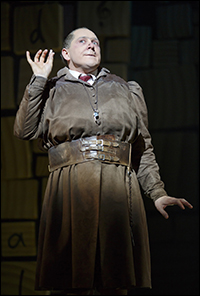
Hidden beneath the Trunchbull's tough and imposing exterior is Bertie Carvel, the charming and handsome British actor who earned an Olivier Award for originating the role in the original West End production of Matilda in 2010.
Playbill spoke with Carvel, a 2013 Best Actor in a Musical Tony Award nominee, the day following his nomination.
This role has a lot of surprises for audiences. There's nothing specifically referenced in the script about Miss Trunchbull being played by a man. It's refreshing to have this presented to audiences without irony. I'm curious to know your approach for playing Trunchbull.
Bertie Carvel: You approach the role like you would anything else, which is to say, "Who is this person? And how can I understand why she does what she does in the way that I can do it from the same place that she is?" So the fact of my being man is sort of irrelevant as far as my process goes. I'm not a woman and she is, but similarly if I were playing Hamlet – I'm not Danish and he is. And those are both important things you have to understand if you're going to mean what you say when you say what these people say. So I just went through the process like I would with any part, and one of the hugely enjoyable parts of that is trying to understand how it feels to be a woman, and to be this woman who has had these experiences.
That's a really wonderful way to give yourself over to a role without having to comment on it. BC: It's a real kind of gymnasium for your imagination - which is why I love this job – you get to flex the muscle of your imagination. Just to think, "I've never experienced life from this angle, but I can imagine what it would be like." And, if you can imagine it well enough, you can persuade other people you're having those experiences or that you've had them. I think that's just so much fun. So it was really about, I suppose, playing it straight–just trying to work out what it feels like to wake up in the morning if you're Agatha Trunchbull. And you're given the situations, you're given the words on the page or the notes on the staff. All of that is given to you. Working out how you're going to stand when you say that part is the fun stuff because it comes out of understanding why you say it in the first place and what you're trying to get to and what you're trying to achieve. What the itch is that you're trying to scratch. And that's why I love my work, because we get to dive into our imaginations every morning and someone pays us to do it. It's kind of incredible!
| |
 |
|
| Carvel in Matilda. | ||
| photo by Joan Marcus |
BC: I think we're all more or less defined by our contradictions. So to understand the "beast of a woman," to understand the beast, and how she became a beast, you have to understand, "How does she feel about being a beast?" and "What does she want to be?" There's a sort of window into her psyche. She's jealous of her acrobat sister who was so skilled it seemed that she could actually fly. And, we know this from the text. We know that she resented her sister's beauty, delicacy, grace, and the love in her life. So you get little windows on the secret inner self of Agatha Trunchbull. I think that's what makes her seem human instead of just a cartoon monster. And, you know, I'm an actor. I'm in the business of making human beings – even if they're monstrous human beings – not cartoon monsters. And the best cartoons are exploded from life. When people draw cartoons of me, they generally pick up on my chin and they make it very big, and the reason they do that is because they see something and they explode that characteristic. But it has to come from truth, otherwise it's just nonsense. The same thing is true of acting. You can turn the dial up on certain characteristics, but they must come from the world around you.
For many actors, making their Broadway debut is a pinnacle moment. What has this continued journey with Matilda been like?
BC: The whole thing is special to me. I get very shy when these sorts of questions come along because it would be untrue to say any one of these experiences is sort of the pinnacle because I love every moment of what I do. I can’t believe it's my living as well as my passion. It makes me the luckiest guy in the room, you know? But it’s all amazing. I think to keep your feet on the ground you just sort of have to, well, keep your feet on the ground. But one day I shall look back on this moment and think, "Why wasn't he cheery in that photograph? Why does he look so glum?"
(Adam Hetrick is the editor in chief of Playbill.com. His work appears in the news, feature and video sections of Playbill.com, as well as in the pages of Playbill magazine. Follow him on Twitter @PlaybillAdamH.)









